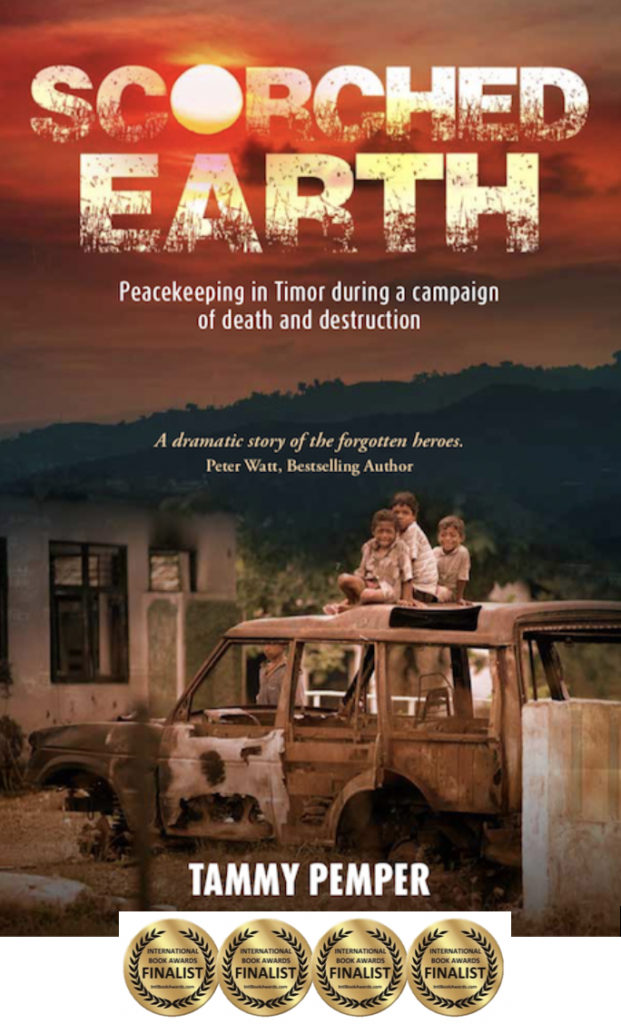Excerpt

CHAPTER 1
Saturday, 28 August 1999
Two unwritten rules of peacekeeping existed.
You’d expect it would be easy to keep two rules, but I broke the first one.
I had to break it to allow myself to live the passion that drove and controlled me, that distinguished one decision from another and determined where I drew my lines. I broke the rule to remain human.
Rule One: Peacekeepers must be neutral.
Impossible. Breaking Rule One created peacekeepers.
If peacekeepers didn’t feel a need to act, if we didn’t have that commitment, we wouldn’t sign up our lives. I was trained to handle a hostage situation, to apply first aid on machete and gunshot wounds, and to recognise who might want to kill me in Timor. I couldn’t help holding biases against those who may want me dead.
My lack of neutrality became the reason I now stood at the exit door of the UN-commissioned Hercules military plane supplied by the Australian Army. The runway we’d landed on was sandwiched between a jungle of palm trees, a line of huts, and the ocean that separated it from visible Indonesian islands. The same coastline from which Indonesian warships had shelled Timorese during their invasion of Timor twenty-four years earlier.
Breaking Rule One was the reason I now descended the metallic, fold-down stairs to serve in a country I might never walk away from.
My foot stepped on the tarmac of their capital, Dili, and I joined the East Timorese fight for life. Timor’s earth had drunk the blood of one third of her population. And still it thirsted. The East Timorese would have their referendum, even if it cost more blood, even if it cost my own. It was the mission I’d committed to months before. This was my duty.
Into the sweltering humidity I followed the others who’d stepped of the same plane. My eyes stung. Prickling heat parched my skin. I briefly squinted at the sun in its clear sky, a sky from which clouds of Indonesian military paratroopers had rained down upon the land during the invasion. My body was covered in sweat, pasting my uniform to my frame.
Several metres in front of me, a couple of plain-clothed civilian International Observers walked as a group, loudly comparing notes. They were in Timor to study and report back to their agencies on the fairness and legitimacy of the referendum’s process. Talking at the volume they did went against all my police instincts. Listening in didn’t.
“Timor’s rising violence doesn’t put us in an easy position, Liam,” said the taller of them. “In our reports, who do we attribute it to? We can’t suggest militia are controlled by the Indonesian government. That’ll get us offside with-”
“It’s not factual, Imran” Liam said. “Militia aren’t controlled by the Indonesian government.”
“Militia have run joint operations with Timor’s Indonesia-controlled military,” Imran argued.
Liam checked over his shoulder. “I’d be careful saying that if I were you.”
I casually flicked my eyes from Liam to the Military Liaison Officers, MLOs, in identical camouflaged uniforms known as ‘cams’. The MLOs had also been on the plane and were now only a few paces behind Imran’s group. The MLO mandate was to keep communication channels open between their country’s military, Timor’s Indonesia-controlled military, and East Timor’s freedom fighters.
Good luck with that, I thought cynically as I strode behind the MLOs. There was no way anyone could work out who to trust in this hotbed.
A woman whose uniform matched mine walked to the left of the MLOs. I’d met her at Darwin Airport while waiting for our Hercules. Her name was Catalina. She was a fellow peacekeeper from Brazil, an experienced police officer, and married with a couple of kids. We were both replacements for two of the two-hundred and seventy-one peacekeepers from twenty-seven countries that had landed in Timor a few months earlier. The other peacekeepers had decided to leave for reasons the UN didn’t tell us. As long as they weren’t in body bags, their reasons didn’t faze me.
Two heavily-armed military soldiers stood on either side of the airport building we were entering. Their trained hands held black aluminium and steel weapons. Long, slim barrels. Distinctive carry handles. M16s. Shorter magazine than the AK-47 but still capable of nine hundred and fifty rounds a minute. At two thousand Aussie dollars each, the Indonesians had invested a serious sum of their country’s funds into East Timor’s airport security.
The soldiers’ eyes tracked us as expected. I held their cold gaze, my motivation cementing. From what I knew they’d had their hand in to date, they represented oppression.
I stepped into the airport. The shipping container sized room had concrete floor-to-ceiling beams, white floor tiles, and a couple of slow turning overhead ceiling fans. A musty odour of perspiration lingered.
A ruler-straight line of armed soldiers stood from the door to the checkpoint. They made it clear enough where we needed to go. Behind the checkpoint counter stood a sole Indonesian officer. I was forced to wait for him while he processed the passengers.
None of us spoke. The less we said, the better. We didn’t want to risk sharing information around those who may not want the UN in Timor-Leste. Anything we said could potentially be misconstrued then used against us.
A soldier moved to readjust his M16, sliding the strap further along his shoulder. Another shuffled a hand off his loaded magazine, exposing a spare magazine strapped to it with red tape. A fast, effcient, re-loading strategy. The one nearest me cleared his throat and wiped his forehead beneath his green beret with the back of his hand.
Buy the Book: Big Sky Publishing, Simon & Schuster, AbeBooks, Amazon (Aust), Amazon, Angus & Robertson, Avid Reader, Berkelouw Books, Better Read, Books on War Australia, Booktopia, Boomerang Books, Dymocks, Fishpond, Hill of Content, Kinokuniya (Aust), Kogan, Koorong, QBD, Readings, The Nile (NZ), Wheelers, Wordery